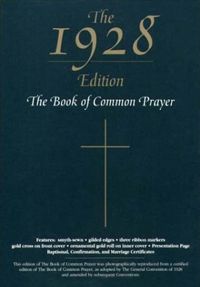Continuing our series, here are two more of my top ten devotional favorites.
 6. The Book of Common Prayer
6. The Book of Common Prayer
When I was in college and searching for faith, I loved to spend time in the beautiful Episcopal cathedral a couple of blocks from our campus. On one of my visits, I stopped in the bookshop and bought a small copy of the The Book of Common Prayer. I was drawn to the stately cadences of the prayers, the beauty of the Bible canticles and the Elizabethan rhythms of the psalms. And I was amazed at how many of the phrases I’d come to love in English poetry had come from this book.
Later, when faith came, I turned to the Prayer Book for its offices of Morning and Evening Prayer—a combination of psalmody, Bible readings and prayers for every day of the year. The offices became a way for me to tune the rhythms of my life to the rhythms of my faith, to put the happenings, large or (mostly) small, of my own life into the ages-long history of God’s dealings with His people. And it gave me a model of how to talk to God and how to listen to His Voice speaking to me in the words of Scripture.
I’m not an Episcopalian, and I often use other offices for my morning and evening prayers, but I still come back to the Prayer Book to find words for the deepest longings of my heart.
 5. Bonaventure: The Soul’s Journey into God, the Tree of Life, the Life of St. Francis
5. Bonaventure: The Soul’s Journey into God, the Tree of Life, the Life of St. Francis
At a later stage of my college career, I found myself drawn particularly to the medieval thinkers who saw their work as, in Anselm’s words, “faith seeking understanding.” Over the years, one of them, Bonaventure, has become a regular, and for me indispensible part of my devotional life.
Bonaventure was a thirteenth-century Franciscan friar, a professor at the University of Paris and the minister-general of the Franciscan order. His way of thinking, with its scholastic distinctions and use of philosophical terminology to explain Biblical truth, is difficult for a twenty-first-century reader, but grappling with it is well worth the effort. In The Soul’s Journey, he follows his spiritual father Francis of Assisi to Mt. La Verna, where Francis had his famous vision of the six-winged seraph. In the wings of the seraph, Bonaventure sees a six-stage path of contemplation, going from the things God has created to the knowledge of God Himself. In The Tree of Life, Bonaventure meditates on the life of Jesus, seen as the Tree of Life bearing the fruit of the virtues. Here Bonaventure is much more concrete, weaving a scriptural tapestry that brings his readers close to Christ in His divine humanity. The Life of Francis presents Bonaventure’s spiritual father as the preeminent imitator of Christ, a living portrait of the Gospel life.
I dip into The Tree of Life and the Life of Francis regularly, and I try to read The Soul’s Journey through at least once a year, but I’m often drawn to its rapturous conclusion, especially when the fire in my own soul is burning low. But that’s a topic for another time.





